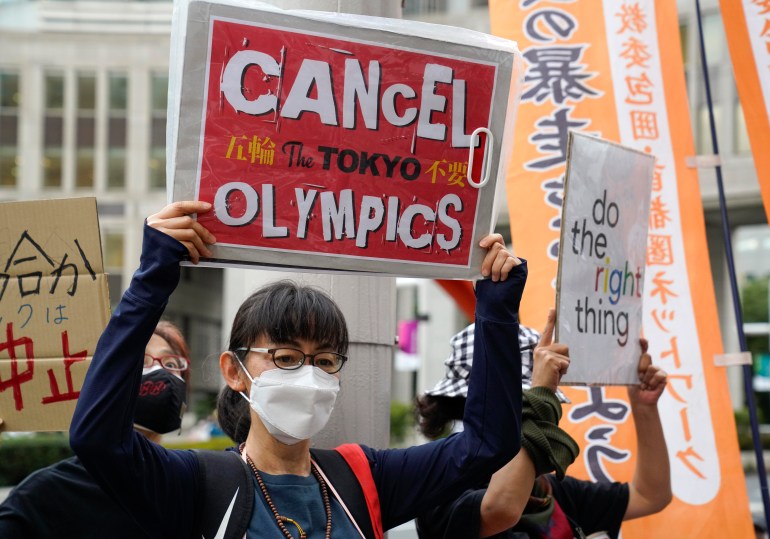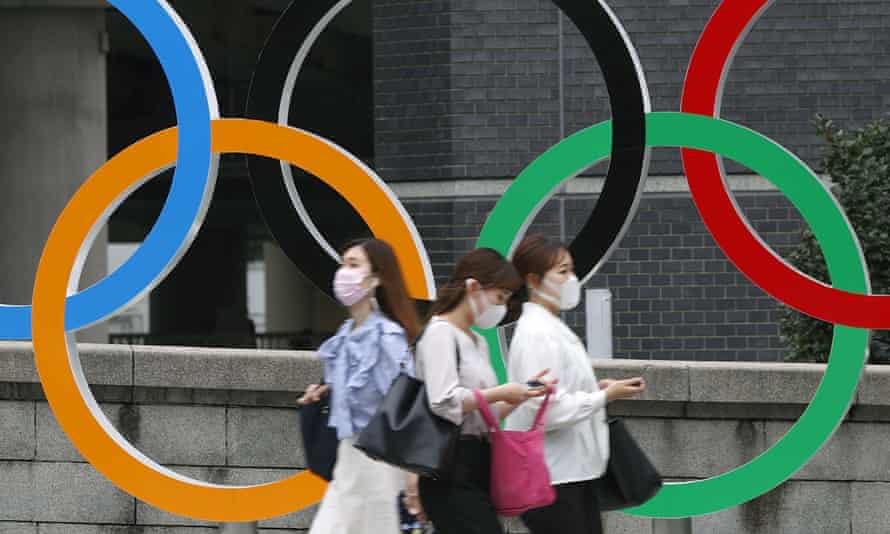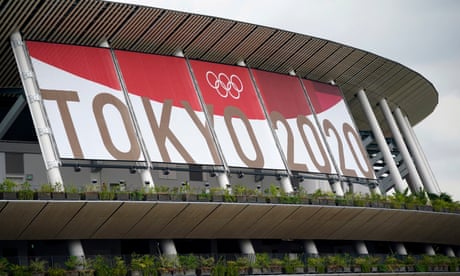Japan to impose COVID emergency in Tokyo, mulls fan-free Olympics
As Japanese capital battles a new wave of cases, pressure grows on Olympic organisers about spectators.

Japan is expected to impose a state of emergency in Tokyo that will last throughout the Olympic Games [Kim Kyung-Hoon/Reuters]
8 Jul 2021
Japan is set to declare a state of emergency for Tokyo to contain the city’s latest wave of coronavirus, which will continue even as it hosts the Olympics, a key minister said on Thursday, as organisers consider banning all spectators from the event.
Medical advisers experts have said for weeks that having no spectators at the Games would be the least risky option amid widespread public concern that the influx of thousands of athletes and officials will fuel a fresh wave of infections.
KEEP READINGSuga’s LDP falls short of majority in Tokyo city election‘This is hell’: 1,500 rescuers search mud for Japan missingTokyo goes to the polls as COVID-shadowed Olympics loomTokyo 2020 organisers warn of no-fan Olympics as COVID cases rise
Organisers have already banned overseas spectators and have set a cap on domestic fans at 50 percent of capacity, to a maximum of 10,000 people. Talks to finalise the restrictions on the spectators are expected either on Thursday or on Friday.
International Olympic Committee (IOC) President Thomas Bach, who arrives in Tokyo on Thursday to oversee the last leg of the preparations, will preside over the talks.
Japan’s economy minister Yasutoshi Nishimura, who heads the government’s coronavirus response, said a state of emergency in Tokyo is set to begin on July 12 and remain in force until Aug 22.
The Olympic Games are scheduled to begin on July 23 and run for two weeks. They will be followed by the Paralympic Games.
The decision to impose a state of emergency follows a rise in Tokyo cases to their highest since mid-May. The Japanese capital is currently under slightly less strict “quasi emergency” measures.
The move is expected to be made official later on Thursday and followed by a news conference by Prime Minister Yoshihide Suga.
Areas neighbouring Tokyo where some Olympic events are also slated to take place, such as Chiba and Kanagawa, are set to remain under “quasi emergency” through August 22.
Underscoring the last-minute nature of the preparations, organisers told Olympic sponsors on Wednesday they are anticipating two scenarios when Tokyo goes under the state of emergency: having no spectators or setting a 5,000-person limit on spectators, a source familiar with the matter told the Reuters news agency.
In the no-spectator scenario, the opening and closing ceremonies, as well as all sports events, will probably be carried out without fans, including tickets allocated to the sponsors, the organisers told companies in online meetings.
If the number of spectators is capped at 5,000 per venue, tickets allocated to Olympic sponsors would be halved, and organisers also expect any session after 9pm (12:00 GMT) would be staged without spectators, the source said.

SOURCE: REUTERS
Tokyo to be put under state of emergency for duration of 2020 Olympic Games
Measure increases the likelihood that the Games in Japan will be held without a single spectator

Japan is set to place Tokyo under a state of emergency starting next week and lasting through the Olympic Games. Photograph: Shinji Kita/A
Justin McCurry in Tokyo
8 Jul 2021
Japan is set to declare a state of emergency for Tokyo to contain the city’s latest wave of coronavirus, which will continue even as it hosts the Olympics, a key minister said on Thursday, as organisers consider banning all spectators from the event.
Medical advisers experts have said for weeks that having no spectators at the Games would be the least risky option amid widespread public concern that the influx of thousands of athletes and officials will fuel a fresh wave of infections.
KEEP READINGSuga’s LDP falls short of majority in Tokyo city election‘This is hell’: 1,500 rescuers search mud for Japan missingTokyo goes to the polls as COVID-shadowed Olympics loomTokyo 2020 organisers warn of no-fan Olympics as COVID cases rise
Organisers have already banned overseas spectators and have set a cap on domestic fans at 50 percent of capacity, to a maximum of 10,000 people. Talks to finalise the restrictions on the spectators are expected either on Thursday or on Friday.
International Olympic Committee (IOC) President Thomas Bach, who arrives in Tokyo on Thursday to oversee the last leg of the preparations, will preside over the talks.
Japan’s economy minister Yasutoshi Nishimura, who heads the government’s coronavirus response, said a state of emergency in Tokyo is set to begin on July 12 and remain in force until Aug 22.
The Olympic Games are scheduled to begin on July 23 and run for two weeks. They will be followed by the Paralympic Games.
The decision to impose a state of emergency follows a rise in Tokyo cases to their highest since mid-May. The Japanese capital is currently under slightly less strict “quasi emergency” measures.
The move is expected to be made official later on Thursday and followed by a news conference by Prime Minister Yoshihide Suga.
Areas neighbouring Tokyo where some Olympic events are also slated to take place, such as Chiba and Kanagawa, are set to remain under “quasi emergency” through August 22.
Underscoring the last-minute nature of the preparations, organisers told Olympic sponsors on Wednesday they are anticipating two scenarios when Tokyo goes under the state of emergency: having no spectators or setting a 5,000-person limit on spectators, a source familiar with the matter told the Reuters news agency.
In the no-spectator scenario, the opening and closing ceremonies, as well as all sports events, will probably be carried out without fans, including tickets allocated to the sponsors, the organisers told companies in online meetings.
If the number of spectators is capped at 5,000 per venue, tickets allocated to Olympic sponsors would be halved, and organisers also expect any session after 9pm (12:00 GMT) would be staged without spectators, the source said.

There have been persistent protests against holding the Games with the issue blamed for a relatively poor performance by the ruling party in recent city elections [Kimimasa Mayama/EPA]The organising committee did not immediately respond to an email seeking comment.
Until this week, officials have insisted they could organise the Games safely with some spectators, but a governing party setback in a Tokyo assembly election on Sunday, which some of Suga’s allies attributed to public anger about the Olympics, had forced the change of tack, sources said.
Japan will hold a parliamentary election later this year and the government’s insistence that the Games – already postponed by a year because of the pandemic – should go ahead could cost it support at the ballot box, they said.
Until this week, officials have insisted they could organise the Games safely with some spectators, but a governing party setback in a Tokyo assembly election on Sunday, which some of Suga’s allies attributed to public anger about the Olympics, had forced the change of tack, sources said.
Japan will hold a parliamentary election later this year and the government’s insistence that the Games – already postponed by a year because of the pandemic – should go ahead could cost it support at the ballot box, they said.
SOURCE: REUTERS
Tokyo to be put under state of emergency for duration of 2020 Olympic Games
Measure increases the likelihood that the Games in Japan will be held without a single spectator

Japan is set to place Tokyo under a state of emergency starting next week and lasting through the Olympic Games. Photograph: Shinji Kita/A
Justin McCurry in Tokyo
THE GUARDIAN
Thu 8 Jul 2021
Japan’s government is to declare a state of emergency in Tokyo that will be in force during the Olympics, as the capital battles a sharp rise in coronavirus infections.
The measure, expected to be made official by the prime minister, Yoshihide Suga, later on Thursday, increases the likelihood that the Games will be held without a single spectator.
The latest blow to Japan’s troubled Olympic preparations comes after Tokyo reported 920 new infections on Wednesday. That compares with 714 last Wednesday and is the highest total since 1,010 were reported on 13 May.
The economy minister, Yasutoshi Nishimura, who heads the government’s coronavirus response, said Tokyo’s fourth state of emergency would begin on 12 July – 11 days before the Games open – and end on 22 August, two days before the start of the Paralympics.

Tokyo Olympics: attendance to be slashed at opening ceremony
Weeks of quasi-emergency measures targeting Tokyo’s night-time economy have failed to prevent the latest wave of cases. The government is expected to reimpose an unpopular ban on serving alcohol at bars and restaurants, Japanese media reported.
The emergency declaration in Tokyo – the centre of Japan’s outbreak for much of the pandemic – is an embarrassment for Suga, whose handling of the crisis saw his party perform badly in Tokyo metropolitan assembly elections last weekend.
“Politically speaking, having no spectators is now unavoidable,” a ruling party source told Reuters.
Suga’s insistence that organisers and the International Olympic Committee (IOC) will be able to stage a “safe and secure” Olympics even as cases rise in the host city could further anger voters just a few months out from a general election.
The IOC and the Tokyo 2020 organising committee said last month that attendances would be capped at 50% of a venue’s capacity, or a maximum of 10,000 people.
But Suga and the organising committee’s president, Seiko Hashimoto, said a ban on fans was also an option, depending on the number of virus cases in the host city.
Medical advisers have said for weeks that having no spectators at the Games would be the least risky option, amid public concern that the arrival of tens of thousands of athletes, officials, sponsors reports and support staff could trigger a new wave of infections.

Surge in Covid-19 cases in Tokyo, less than a month out from Olympics
Having banned overseas sports fans, the Olympic movement was pinning its hopes on a limited number Japanese spectators creating a semblance of atmosphere.
But with the opening ceremony just two weeks away, it is looking more likely that competitions will take place in empty venues, including the opening ceremony at the new $1.4bn national stadium. IOC officials, however, could attend in their role as “organisers”, media reports have said.
The IOC, organisers and Japanese government officials were due to meet by the end of the week to discuss spectator numbers. The talks will include the IOC’s president, Thomas Bach, who arrives in Tokyo on Thursday to oversee the last phase of preparations.
Bach, who will self-isolate at his hotel for three days, and other senior IOC officials have drawn criticism for insisting the Games will go ahead regardless of case numbers and pressure on medical services in Tokyo.
Earlier this year, John Coates, an IOC vice-president who is overseeing preparations, said the Games could “absolutely” be held even if Tokyo were under a state of emergency.
Suga has backed the IOC’s push to stage the Games, despite widespread opposition among the Japanese public and warnings from his own chief medical adviser, Shigeru Omi, that the Olympics – combined with the summer holidays and the spread of the more transmissible Delta variant – could spark a surge in infections.
“Infections are in their expansion phase and everyone in this country must firmly understand how serious that is,” Omi told reporters on Wednesday. “The period from July to September is the most critical time for Japan’s Covid-19 measures.”
Japan has reported about 810,000 cases and nearly 14,900 deaths. Only 15% of the population is fully vaccinated, compared with 47.4% in the US and almost 50% in Britain.
Agencies contributed to this report
Thu 8 Jul 2021
Japan’s government is to declare a state of emergency in Tokyo that will be in force during the Olympics, as the capital battles a sharp rise in coronavirus infections.
The measure, expected to be made official by the prime minister, Yoshihide Suga, later on Thursday, increases the likelihood that the Games will be held without a single spectator.
The latest blow to Japan’s troubled Olympic preparations comes after Tokyo reported 920 new infections on Wednesday. That compares with 714 last Wednesday and is the highest total since 1,010 were reported on 13 May.
The economy minister, Yasutoshi Nishimura, who heads the government’s coronavirus response, said Tokyo’s fourth state of emergency would begin on 12 July – 11 days before the Games open – and end on 22 August, two days before the start of the Paralympics.

Tokyo Olympics: attendance to be slashed at opening ceremony
Weeks of quasi-emergency measures targeting Tokyo’s night-time economy have failed to prevent the latest wave of cases. The government is expected to reimpose an unpopular ban on serving alcohol at bars and restaurants, Japanese media reported.
The emergency declaration in Tokyo – the centre of Japan’s outbreak for much of the pandemic – is an embarrassment for Suga, whose handling of the crisis saw his party perform badly in Tokyo metropolitan assembly elections last weekend.
“Politically speaking, having no spectators is now unavoidable,” a ruling party source told Reuters.
Suga’s insistence that organisers and the International Olympic Committee (IOC) will be able to stage a “safe and secure” Olympics even as cases rise in the host city could further anger voters just a few months out from a general election.
The IOC and the Tokyo 2020 organising committee said last month that attendances would be capped at 50% of a venue’s capacity, or a maximum of 10,000 people.
But Suga and the organising committee’s president, Seiko Hashimoto, said a ban on fans was also an option, depending on the number of virus cases in the host city.
Medical advisers have said for weeks that having no spectators at the Games would be the least risky option, amid public concern that the arrival of tens of thousands of athletes, officials, sponsors reports and support staff could trigger a new wave of infections.

Surge in Covid-19 cases in Tokyo, less than a month out from Olympics
Having banned overseas sports fans, the Olympic movement was pinning its hopes on a limited number Japanese spectators creating a semblance of atmosphere.
But with the opening ceremony just two weeks away, it is looking more likely that competitions will take place in empty venues, including the opening ceremony at the new $1.4bn national stadium. IOC officials, however, could attend in their role as “organisers”, media reports have said.
The IOC, organisers and Japanese government officials were due to meet by the end of the week to discuss spectator numbers. The talks will include the IOC’s president, Thomas Bach, who arrives in Tokyo on Thursday to oversee the last phase of preparations.
Bach, who will self-isolate at his hotel for three days, and other senior IOC officials have drawn criticism for insisting the Games will go ahead regardless of case numbers and pressure on medical services in Tokyo.
Earlier this year, John Coates, an IOC vice-president who is overseeing preparations, said the Games could “absolutely” be held even if Tokyo were under a state of emergency.
Suga has backed the IOC’s push to stage the Games, despite widespread opposition among the Japanese public and warnings from his own chief medical adviser, Shigeru Omi, that the Olympics – combined with the summer holidays and the spread of the more transmissible Delta variant – could spark a surge in infections.
“Infections are in their expansion phase and everyone in this country must firmly understand how serious that is,” Omi told reporters on Wednesday. “The period from July to September is the most critical time for Japan’s Covid-19 measures.”
Japan has reported about 810,000 cases and nearly 14,900 deaths. Only 15% of the population is fully vaccinated, compared with 47.4% in the US and almost 50% in Britain.
Agencies contributed to this report
No comments:
Post a Comment